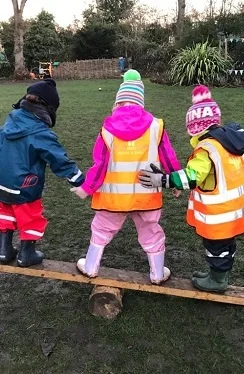We love debating and talking about all things that impact our children and their emotional resilience from schooling to social skills, to pioneering collaborative minds that will change our world for a better tomorrow. If you feel strongly about something, please do get in touch and let us know. Equally, everything below is a conversation starter, so let us know what you think!
The wellbeing and mental health in children has been a growing topic of interest in the past decade as more evidence and understanding comes to light within the medical community. However it was still surprising to find out that “Referrals to child mental health units from UK primary schools for pupils aged 11 and under have risen by nearly 50% in three years” (BBC, 2019). We’ve spoken often about the physical, social and cognitive benefits that outdoor play gives our children, such as in our previous blog about cold weather play. However, discussion surrounding the mental benefits such as self-esteem and confidence are sometimes overlooked in favour of those previously listed impacts. And with the “acute crisis” the BBC have reported on recently, it is more important than ever to address how we can support our children.
Happiness and Play
It is no secret that being able to learn and play in the outdoors is a form of escapism for children who spend most of the day in a classroom. The stress that our curriculum places on their young shoulders can sometimes get too much. This is due to the amount of pressure to understand and retain large quantities of information, particularly as they get older. Being able to appreciate time in nature, breathing fresh air and using their imagination to unknowingly implement the lessons they have learned indoors gives children are given the opportunity to take a step back and enjoy themselves. A 2016/17 study carried out at Sheffield Hallam University concluded that life satisfaction and happiness are higher for people who are physically active, and their levels of anxiety are lower. “We now have conclusive evidence that physical activity is clearly linked to mental wellbeing” (Lisa O’Keefe, Sport England, 2017). In addition, studies across the UK have also shown that even 5 minutes of exercise and play in an outdoor environment can rapidly improve self-esteem and mental health and wellbeing in young people.
The Power of Empathy
In the 2019 study by the Department of Education, it was found that there is a decline in wellbeing and happiness within 13-15 year olds compared to 10-12 year olds. With the rapid rise in popularity of social media over the past two decades, there is a distinct lack of empathy and care for each other, the world that we live in, and ourselves. Outdoor play with friends encourages collaboration and understanding, allowing children to learn when to take turns and become attuned with each other’s moods. This in turn gives the children the opportunity to recognize their own feelings and gives them a safe environment to project these thoughts without fear or embarrassment. Giving children the chance to decompress and work through any issues whilst clearing their mind and focusing on specific outdoor tasks improves their capability of handling confusing thoughts or issues in the future. Introducing these techniques early on in a child’s development ensures they can properly express themselves later on in life, when more societal pressures build up.
75% of all mental health problems are established by the time someone is 18 (Children’s Society, 2018). By giving children the tools and help they need at a young age, we can radically reduce those numbers despite the pressures of modern society.







